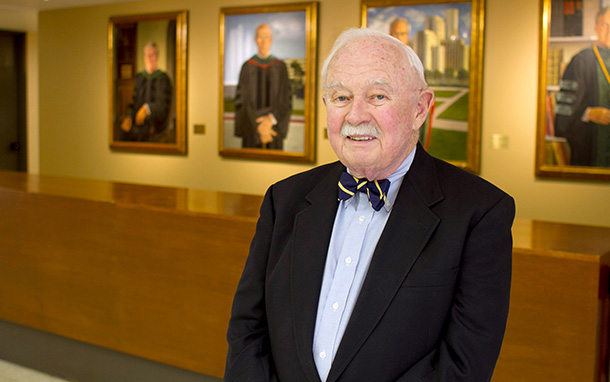Though decades have passed since Michael Kennedy, MD ’66, MS, first enrolled at USC, he still thinks about the unlikely course of events that led the Chicago native to earning his medical degree from the Keck School of Medicine.
“It was all a surprise,” Kennedy said recently. “I had no idea what to expect because nobody in my family had gone to college.”
The Mission Viejo resident is a father of five, including USC graduates Michael Jr., ’90, and Kathleen, ’89, and has five grandchildren. In June, Kennedy published a memoir, “War Stories: 50 Years in Medicine,” which reflects on his life and career in the operating room through the 20th century. But a career in medicine is not what the retired surgeon originally had in mind.
There were no student loans and few scholarships available to students in the mid-1950s, so the then-high school senior turned down a spot at the California Institute of Technology for a scholarship at USC’s engineering program. After two years at USC, a series of events led him to work at the Douglas Aircraft Company, join the Air National Guard and, following a late-night conversation with roommates at the Playa del Rey beach, apply for medical school. But even that decision had a hiccup, as his National Guard unit got called up one month after he started medical school, delaying enrollment for another year.
In the 50 years since, the medical field has changed drastically. But from Kennedy’s perspective, which included more than 20 years on the surgical faculty at Los Angeles County + USC Medical Center and more than a decade as a professor in the Introduction to Clinical Medicine program at the Keck School, at least one thing has remained the same: high-quality educators.
“My first year of internship, a resident I was working with in the emergency department at (Massachusetts General Hospital) had been an intern at County and he was always telling me rules he had learned at County, he would quote USC faculty for why he did things,” Kennedy said. “And I thought, ‘Wow, he’s a resident at Mass General but he thinks so highly of USC.’ He clued me in that USC faculty were really superior at teaching.”
His time spent teaching first- and second-year medical students prompted him to write his first book, “A Brief History of Disease, Science and Medicine,” in 2004.
“Every year I try to convert at least one of my students to surgery,” he said. “It’s fun when you can influence students, that’s what I love about the classroom.”
— Melissa Masatani


